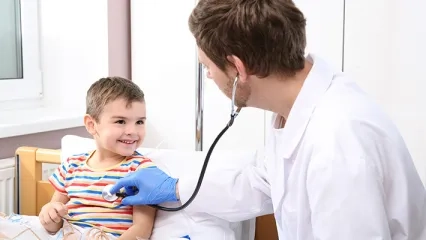Alo Yeditepe
Alo Yeditepe
What is Measles? Symptoms and Treatment
Pediatric Infectious Diseases Specialist Assoc. Prof. Dr. Emine Manolya KARA noted that Turkey is among the top 10 countries in Europe where measles cases are most common. Dr. Emine Manolya KARA warned, "This rapidly transmitted disease can lead to dangerous consequences."
Experts state that there was a 79 percent increase in measles cases in the world last year compared to the previous year. More than 30 thousand measles cases were reported in the WHO European Region between January and October 2023. This figure represents an increase of more than 30 times compared to the 941 cases detected in the whole of 2022. Pediatric Infectious Diseases Specialist Assoc. Prof. stated that according to WHO data, the number of measles cases reported in our country in the last year was 4 thousand 903, and this number was recorded as 125 in the previous year. Dr. Emine Manolya Kara explained the ways to protect against the disease as follows:
What is Measles?
Measles is a disease caused by a virus called Measles morbillivirus. Although it is commonly seen in childhood, it can affect individuals of any age who have not been vaccinated. Recently, measles has regained global attention as a highly contagious infectious disease. The symptoms usually appear approximately 10-14 days after infection.
What are the symptoms of measles?
Measles is a highly contagious disease caused by a virus. It is not possible to distinguish early symptoms from the common cold. In the later days of the disease, high fever, cough, runny nose, redness of the eyes (conjunctivitis) and intense skin rash that spreads all over the body are observed.
How is measles transmitted?
Measles is one of the world's most contagious diseases; It is spread through contact with infected nose or throat secretions (coughing or sneezing) or by breathing air exhaled by someone with measles. The virus remains active and infectious in the air or on infected surfaces for up to two hours. It is therefore highly contagious, and a person infected with measles can infect nine out of 10 unvaccinated close contacts. The virus can be transmitted by an infected person from four days before the onset of the rash to four days after the rash appears.
When should measles vaccination be done?
The best way to prevent getting measles or spreading the disease to others is to get vaccinated. The vaccine is safe and effective. According to the Ministry of Health Vaccination Schedule in our country, the measles-rubella-mumps (MMR) vaccine is administered free of charge to children at the 12th and 48th months. In periods when the number of cases increases (this is the case today), an additional protection dose is administered when the baby is 9 months old. Since measles virus circulation is intense in society, it is vital that these vaccinations are not interrupted.
Who is at Risk for Measles?
Measles can affect anyone. However, complications from measles are most common in children under 5 and adults over 30. Severe illness is more common in malnourished children, especially those who do not get enough vitamin A, and those with weakened immune systems due to other diseases such as HIV, cancer, organ transplantation. Measles itself also weakens the immune system and leaves the body vulnerable to other infections.
What Problems Does Measles Cause?
Measles infection can cause blindness, encephalitis (an infection that causes swelling of the brain and potentially brain damage), severe diarrhea and associated dehydration, ear infections, serious respiratory problems including pneumonia, and death. If a woman contracts measles during pregnancy, it can be dangerous for the mother and cause her baby to be born prematurely with a low birth weight. The risk is higher in children who have had measles within the first two years, and a potentially fatal neurological disease called SSPE (Subacute Sclerosing Panencephalitis) may develop in the following years after measles infection. The measles vaccine provides protection against all of these complications.
How to Treat Measles?
There is no specific treatment for measles. Management of the disease should focus on relieving symptoms, keeping the person comfortable, and preventing complications. Adequate fluid intake is very important to replace fluids lost due to fever, diarrhea or vomiting. Antibiotics may be required to treat pneumonia and ear and eye infections that can occur during measles. Giving vitamin A supplements, especially to those with vitamin A deficiency and children under the age of two, can reduce complications related to the disease.
How can we protect ourselves from measles?
The only precaution against measles is vaccination. Childhood vaccinations should never be neglected and should be administered starting from the age of 9 months. It is important to keep younger babies away from public areas such as shopping malls where people stay indoors for long periods of time. A doctor should be consulted after contact with a patient with fever and rash. Although measles is common in childhood, it is also risky for adults who are not vaccinated or have not had the disease. Therefore, it would be appropriate for people in the risk group to stay away from crowded environments and consult a specialist doctor about the precautions that can be taken.
Frequently Asked Questions about Measles
What Are the Mild Symptoms of Measles?
Measles symptoms are generally severe, but in some cases, they can be milder. For these patients, the first symptom is usually a mild fever. Additionally, a mild cough, runny nose resembling cold or flu, eye watering, and slight red rashes limited to specific areas of the body may be observed. These symptoms can be confused with those of other infectious diseases. However, due to the contagious nature of measles, if suspected, it is essential to seek medical attention without delay. Measles is usually milder in vaccinated individuals.
How Long Does Measles Last?
Measles typically lasts 7-10 days, but the full recovery time may vary from person to person. Symptoms usually begin approximately 10-14 days after infection, with rashes becoming more prominent as the disease progresses. There is no specific treatment for measles, but symptomatic treatment can be applied to alleviate symptoms. Rash and fatigue may persist for a longer time during recovery.
When Is the Measles Vaccine Given?
The measles vaccine is part of a globally implemented vaccination program that provides effective protection. The vaccine prevents the spread of the disease and helps create herd immunity. In Turkey, according to the Ministry of Health's Vaccination Schedule, children receive the measles, mumps, and rubella (MMR) vaccine at the 12th month and the 48th month free of charge. In periods of increased cases (which is the case nowadays), an additional booster dose is given when the baby is 9 months old.
What Should Be Done for a Child with Measles?
A child with suspected or visible measles symptoms should be seen by a healthcare professional without delay. It is crucial to follow the treatment plan prescribed by the doctor. To support the child’s recovery: Ensure adequate rest, Keep the child cool in case of fever, Make sure the child is drinking enough fluids, Provide a diet with foods that strengthen the immune system, Avoid contact with healthy individuals and ensure good hygiene practices to prevent the spread of the disease.
What Should Be Fed to a Child with Measles?
It is essential to provide foods that boost the immune system to help the child recover from measles. Since the child’s appetite may decrease, it is best to offer small, frequent meals. Fluid Intake: Since fluid loss may occur during measles, drinking plenty of fluids is crucial. Sugar-free fruit juices, chicken broth, vegetable soups, ayran, or kefir are good options. Easy-to-Digest Foods: Offer easily digestible and light foods. For example, fruit purees like apple and banana, boiled potatoes, yogurt, oatmeal, or rice porridge can be given without overwhelming the child. Vitamin C-Rich Foods: Measles strains the immune system, so foods rich in Vitamin C (such as oranges, mandarins, and leafy green vegetables) should be prioritized. Soothing Foods for the Throat: Since the throat may be sensitive, it’s best to avoid acidic, spicy, or excessively hot foods. The child’s recovery process should be supported in line with the doctor's recommendations.
About
Faculty and Year of Graduation:
Istanbul University Cerrahpasa Medical Faculty Uğur Derman English Programme-2008
”
See Also
- What is Whooping Cough? The Importance of Whooping Cough Vaccination During Pregnancy
- What is Molluscum Contagiosum? What are the Symptoms?
- Which Vaccine Should be Given in Adolescence and When?
- Precautions to Take Protecting Children from Infections
- Hand Foot and Mouth Disease Symptoms and Prevention Methods
- Flu Vaccination in Children
- Congenital CMV Infection in the Neonatal Period
- Is the Incidence of Reflux Increasing Among Children?
Alo Yeditepe





